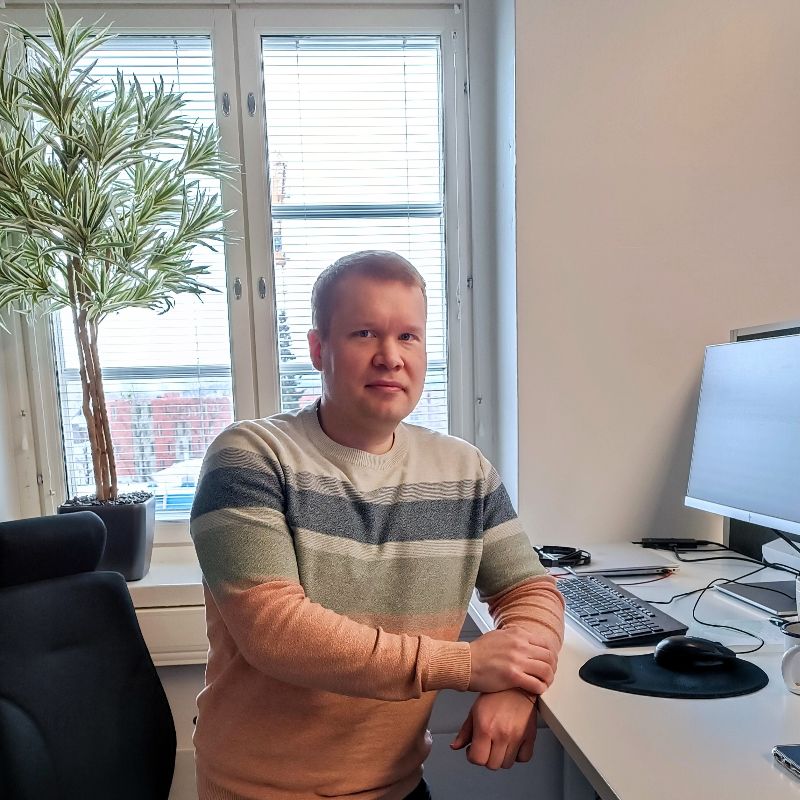Transport planner
"It’s great to be part of a chain where customers’ waste is transported from properties for reuse. In my opinion, waste management works well all over Finland, and I have always felt that my work is meaningful."

- Juhani Pasanen
- Transport planner at Mustankorkea Oy.
- Graduated as a Bachelor of Business Administration from Jamk University of Applied Sciences.
- 15 years of work experience in the field.
Briefly explain what you do for a living.
I work as a transport planner, and my job is to organise waste collection from residential properties in four of our owner municipalities: Jyväskylä, Laukaa, Muurame and Toivakka. There are about 178,000 people who live in the collection area, and we empty waste containers about 1.5 million times annually.
How have you ended up in the profession of your choice?
As part of our transport team, I make sure that waste collection trucks know what, where and when to empty every day. The work involves a lot of meetings, planning and problem-solving with customers, contractors and other partners. The transport team is also responsible for the regular tendering of contract areas and signing new contracts.
I ended up working at Mustankorkea through a traineeship in 2009. Before working as a transport planner, I was a scale operator for several years at a waste centre and did customer service for municipal waste management for a few years. I have liked working in the waste sector, and my job descriptions have varied nicely over the years.
Describe your typical working day or week.
My typical working day includes supervising transports and sorting out all kinds of things. At the beginning of a working day, I’ll check that waste trucks are out and about according to plan and that the emptying lists have been sent to the truck terminals. We empty about 6,000 containers every day in our operating area. The drivers record related feedback, and it is my job to look into that feedback. The type of feedback ranges widely, but usually it’s related to different kinds of problems with emptying containers. For example, some waste rooms may require a key or PIN code, or a property may have started some construction, so their waste containers will need to be moved to a better place.
What kind of work environment or working hours do you have?
I work at our office at least three days a week, and the rest of the week I work from home. I have flexible working hours, but I usually work between 8:15 and 16:00.
What kind of competence or qualities are required in the profession?
This job requires problem-solving skills. It is also useful to have knowledge of the waste sector, related equipment and collection gear. Waste management is a service that has to function in all circumstances because any prolonged problems will become evident in the environment really quickly.
Being calm and able to handle stress helps in any unpredictable situations; sometimes schedules change due to things like challenging driving conditions or equipment failures. It is important to be able to prioritise collections by waste fraction to decide which containers we’ll empty when we are short on time.
What is the best thing about your profession?
The best thing about this profession is that no day is the same. Sometimes I do practical work, like monitoring routes, solving problems and planning how to make waste collection more efficient. At other times, we plan future contract areas and work on competitive tendering. It’s great to be part of a chain where customers’ waste is transported from properties for reuse. In my opinion, waste management works well all over Finland, and I have always felt that my work is meaningful.
What are the downsides of the profession or what seems challenging?
In this work, you sometimes have to tolerate the stress that comes with multitasking. I also face challenging customer service situations every week, mainly related to problems with emptying waste containers. Some customers may not see the situation from the driver’s perspective. In these situations, it is my job to mediate and try to find a solution.
What would you tell a person considering the profession of a transport planner?
For municipal waste management, you may not necessarily need previous work experience as a transport planner. It helps to know about waste collection and waste management regulations, but this work is best learned by doing it. Experience with driving a waste truck is a plus, while another path is from waste management customer service, which is what I did. Our company has many employees with degrees in the environmental sector.
How do you see the future of your profession?
I believe that in the future, automation and artificial intelligence will become more important in daily “conveyor belt work”. The job of a transport planner includes tasks that could be done completely automatically in the future with self-driving systems. However, because the job is so versatile, I don’t think that everything could be done fully automatically. Transport planners’ skills will be a necessary part of effective waste management even in the future.
